Analysis of Lehman Brothers' Collapse: Business Law Case Study
VerifiedAdded on 2023/01/24
|7
|1663
|32
Case Study
AI Summary
This case study examines the Lehman Brothers' agency problem, focusing on the failure of the board of directors to fulfill their duties. The analysis delves into the agency relationship, the roles and responsibilities of the board, and the factors that contributed to the company's collapse. It explores the technical issues and corporate governance failures, highlighting the lack of financial experience and the conflicts of interest among the directors. The study discusses the importance of fiduciary duties, independent directors, and alignment of interests to mitigate agency problems. The case concludes with the importance of learning from the Lehman Brothers' collapse to prevent similar failures in other companies. The study also emphasizes on the importance of shareholders and directors to work as a single unit to avoid any agency problems.
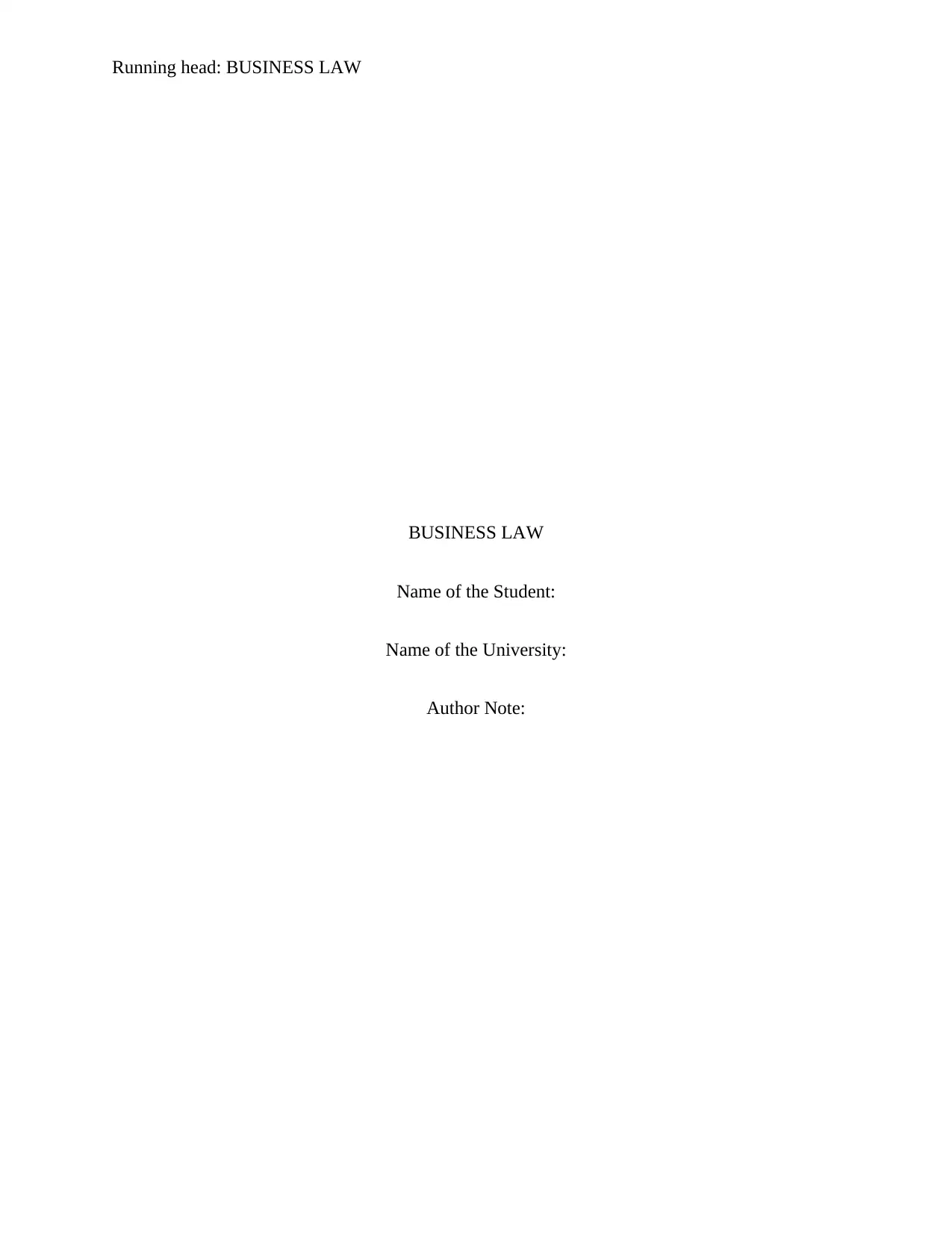
Running head: BUSINESS LAW
BUSINESS LAW
Name of the Student:
Name of the University:
Author Note:
BUSINESS LAW
Name of the Student:
Name of the University:
Author Note:
Paraphrase This Document
Need a fresh take? Get an instant paraphrase of this document with our AI Paraphraser
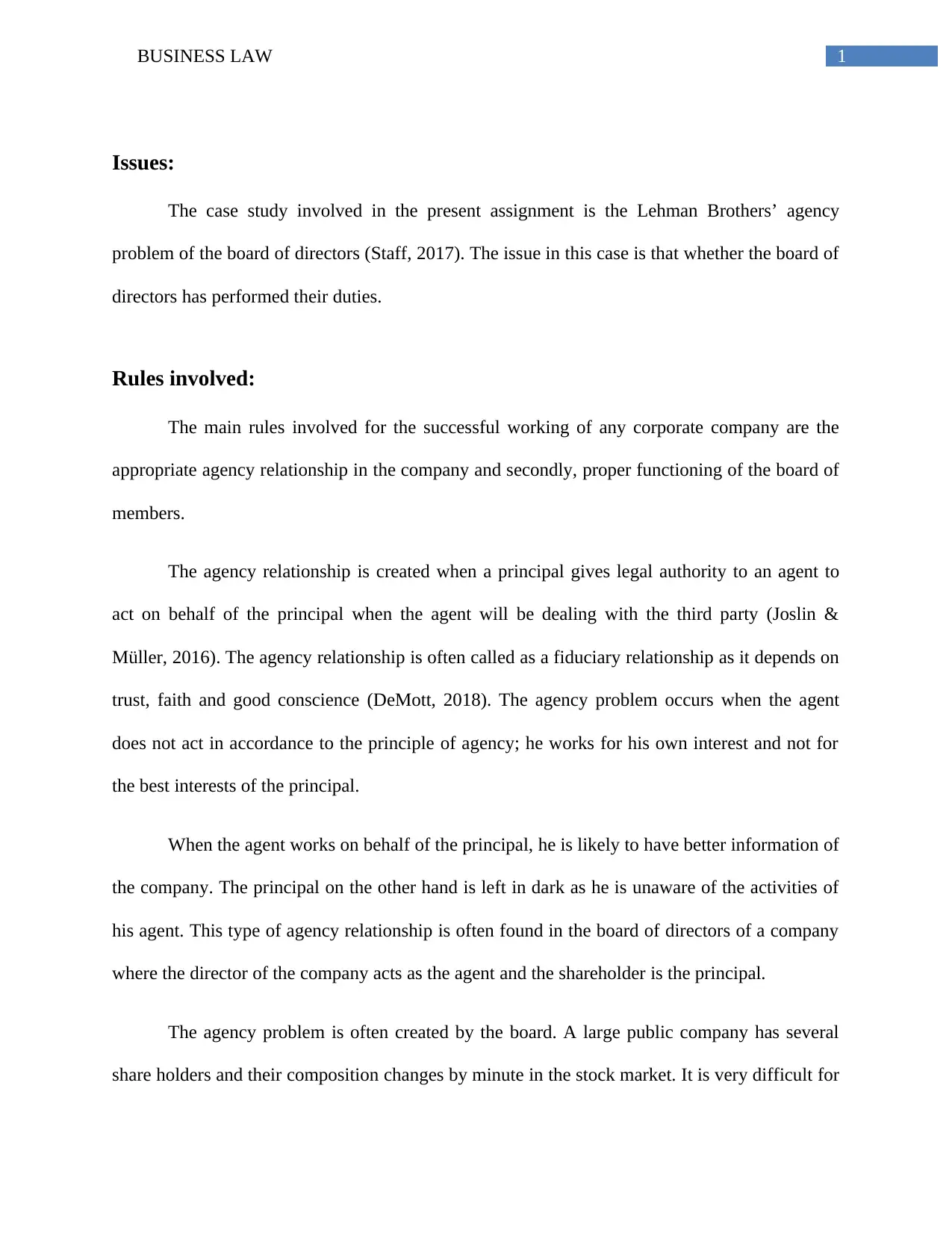
1BUSINESS LAW
Issues:
The case study involved in the present assignment is the Lehman Brothers’ agency
problem of the board of directors (Staff, 2017). The issue in this case is that whether the board of
directors has performed their duties.
Rules involved:
The main rules involved for the successful working of any corporate company are the
appropriate agency relationship in the company and secondly, proper functioning of the board of
members.
The agency relationship is created when a principal gives legal authority to an agent to
act on behalf of the principal when the agent will be dealing with the third party (Joslin &
Müller, 2016). The agency relationship is often called as a fiduciary relationship as it depends on
trust, faith and good conscience (DeMott, 2018). The agency problem occurs when the agent
does not act in accordance to the principle of agency; he works for his own interest and not for
the best interests of the principal.
When the agent works on behalf of the principal, he is likely to have better information of
the company. The principal on the other hand is left in dark as he is unaware of the activities of
his agent. This type of agency relationship is often found in the board of directors of a company
where the director of the company acts as the agent and the shareholder is the principal.
The agency problem is often created by the board. A large public company has several
share holders and their composition changes by minute in the stock market. It is very difficult for
Issues:
The case study involved in the present assignment is the Lehman Brothers’ agency
problem of the board of directors (Staff, 2017). The issue in this case is that whether the board of
directors has performed their duties.
Rules involved:
The main rules involved for the successful working of any corporate company are the
appropriate agency relationship in the company and secondly, proper functioning of the board of
members.
The agency relationship is created when a principal gives legal authority to an agent to
act on behalf of the principal when the agent will be dealing with the third party (Joslin &
Müller, 2016). The agency relationship is often called as a fiduciary relationship as it depends on
trust, faith and good conscience (DeMott, 2018). The agency problem occurs when the agent
does not act in accordance to the principle of agency; he works for his own interest and not for
the best interests of the principal.
When the agent works on behalf of the principal, he is likely to have better information of
the company. The principal on the other hand is left in dark as he is unaware of the activities of
his agent. This type of agency relationship is often found in the board of directors of a company
where the director of the company acts as the agent and the shareholder is the principal.
The agency problem is often created by the board. A large public company has several
share holders and their composition changes by minute in the stock market. It is very difficult for
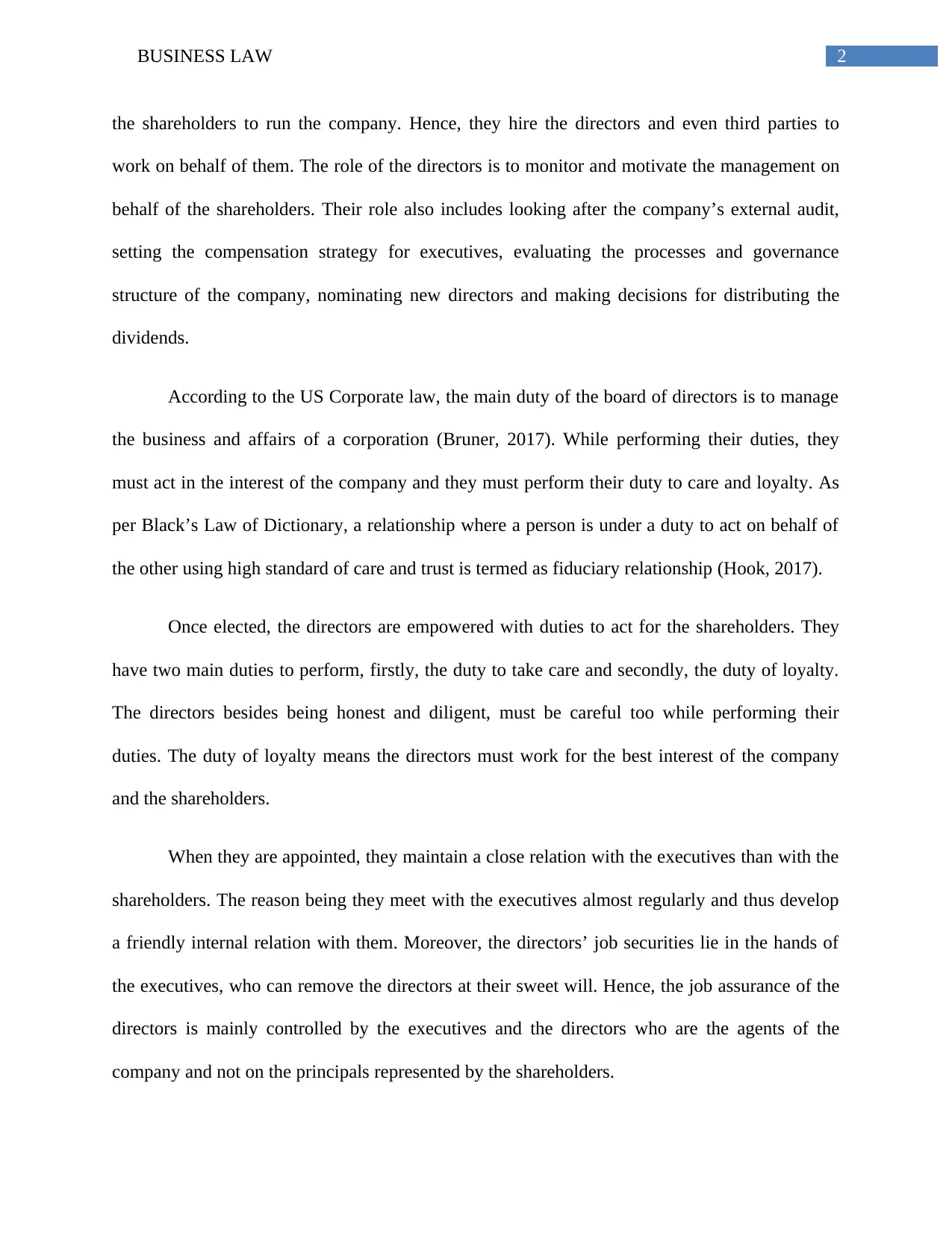
2BUSINESS LAW
the shareholders to run the company. Hence, they hire the directors and even third parties to
work on behalf of them. The role of the directors is to monitor and motivate the management on
behalf of the shareholders. Their role also includes looking after the company’s external audit,
setting the compensation strategy for executives, evaluating the processes and governance
structure of the company, nominating new directors and making decisions for distributing the
dividends.
According to the US Corporate law, the main duty of the board of directors is to manage
the business and affairs of a corporation (Bruner, 2017). While performing their duties, they
must act in the interest of the company and they must perform their duty to care and loyalty. As
per Black’s Law of Dictionary, a relationship where a person is under a duty to act on behalf of
the other using high standard of care and trust is termed as fiduciary relationship (Hook, 2017).
Once elected, the directors are empowered with duties to act for the shareholders. They
have two main duties to perform, firstly, the duty to take care and secondly, the duty of loyalty.
The directors besides being honest and diligent, must be careful too while performing their
duties. The duty of loyalty means the directors must work for the best interest of the company
and the shareholders.
When they are appointed, they maintain a close relation with the executives than with the
shareholders. The reason being they meet with the executives almost regularly and thus develop
a friendly internal relation with them. Moreover, the directors’ job securities lie in the hands of
the executives, who can remove the directors at their sweet will. Hence, the job assurance of the
directors is mainly controlled by the executives and the directors who are the agents of the
company and not on the principals represented by the shareholders.
the shareholders to run the company. Hence, they hire the directors and even third parties to
work on behalf of them. The role of the directors is to monitor and motivate the management on
behalf of the shareholders. Their role also includes looking after the company’s external audit,
setting the compensation strategy for executives, evaluating the processes and governance
structure of the company, nominating new directors and making decisions for distributing the
dividends.
According to the US Corporate law, the main duty of the board of directors is to manage
the business and affairs of a corporation (Bruner, 2017). While performing their duties, they
must act in the interest of the company and they must perform their duty to care and loyalty. As
per Black’s Law of Dictionary, a relationship where a person is under a duty to act on behalf of
the other using high standard of care and trust is termed as fiduciary relationship (Hook, 2017).
Once elected, the directors are empowered with duties to act for the shareholders. They
have two main duties to perform, firstly, the duty to take care and secondly, the duty of loyalty.
The directors besides being honest and diligent, must be careful too while performing their
duties. The duty of loyalty means the directors must work for the best interest of the company
and the shareholders.
When they are appointed, they maintain a close relation with the executives than with the
shareholders. The reason being they meet with the executives almost regularly and thus develop
a friendly internal relation with them. Moreover, the directors’ job securities lie in the hands of
the executives, who can remove the directors at their sweet will. Hence, the job assurance of the
directors is mainly controlled by the executives and the directors who are the agents of the
company and not on the principals represented by the shareholders.
⊘ This is a preview!⊘
Do you want full access?
Subscribe today to unlock all pages.

Trusted by 1+ million students worldwide
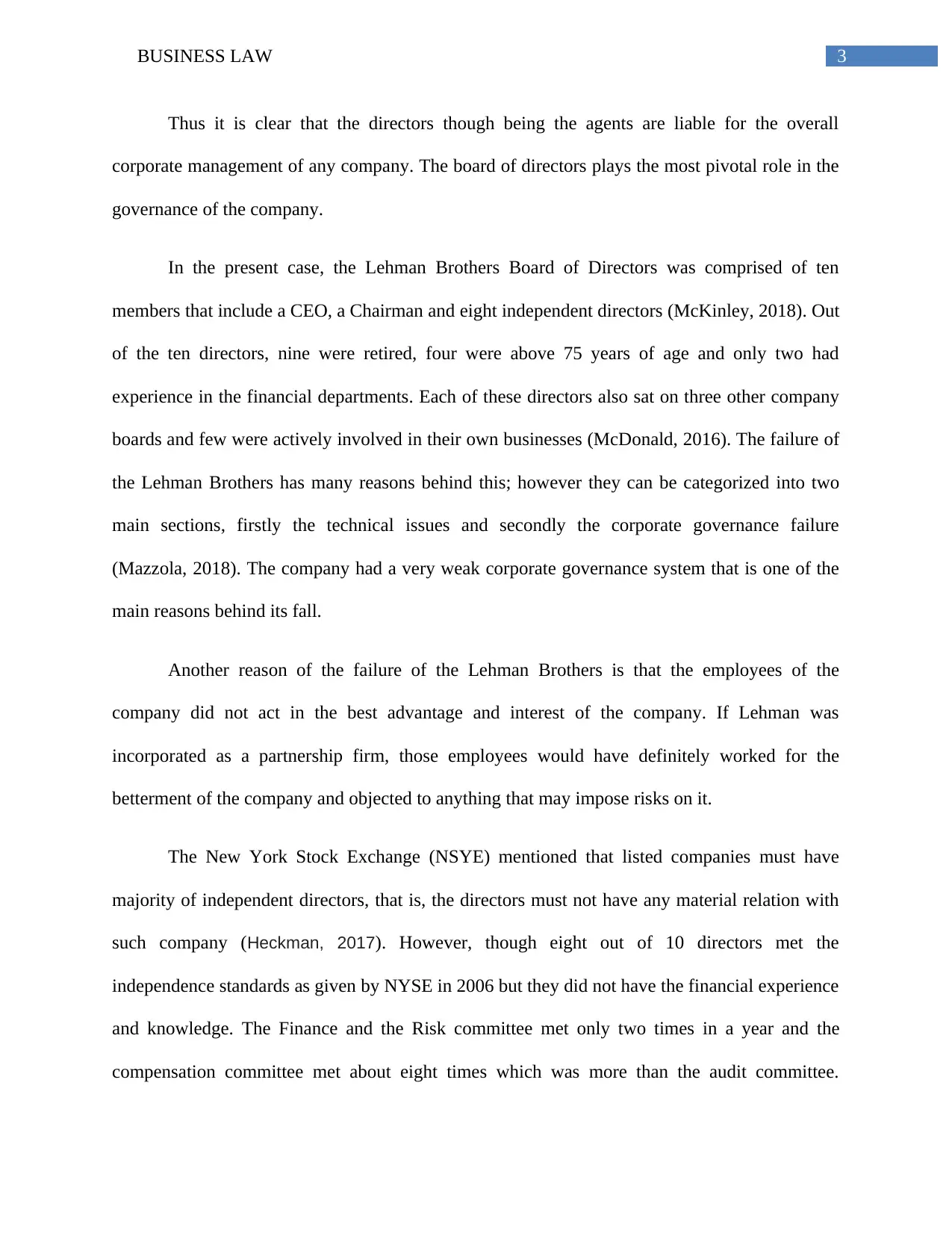
3BUSINESS LAW
Thus it is clear that the directors though being the agents are liable for the overall
corporate management of any company. The board of directors plays the most pivotal role in the
governance of the company.
In the present case, the Lehman Brothers Board of Directors was comprised of ten
members that include a CEO, a Chairman and eight independent directors (McKinley, 2018). Out
of the ten directors, nine were retired, four were above 75 years of age and only two had
experience in the financial departments. Each of these directors also sat on three other company
boards and few were actively involved in their own businesses (McDonald, 2016). The failure of
the Lehman Brothers has many reasons behind this; however they can be categorized into two
main sections, firstly the technical issues and secondly the corporate governance failure
(Mazzola, 2018). The company had a very weak corporate governance system that is one of the
main reasons behind its fall.
Another reason of the failure of the Lehman Brothers is that the employees of the
company did not act in the best advantage and interest of the company. If Lehman was
incorporated as a partnership firm, those employees would have definitely worked for the
betterment of the company and objected to anything that may impose risks on it.
The New York Stock Exchange (NSYE) mentioned that listed companies must have
majority of independent directors, that is, the directors must not have any material relation with
such company (Heckman, 2017). However, though eight out of 10 directors met the
independence standards as given by NYSE in 2006 but they did not have the financial experience
and knowledge. The Finance and the Risk committee met only two times in a year and the
compensation committee met about eight times which was more than the audit committee.
Thus it is clear that the directors though being the agents are liable for the overall
corporate management of any company. The board of directors plays the most pivotal role in the
governance of the company.
In the present case, the Lehman Brothers Board of Directors was comprised of ten
members that include a CEO, a Chairman and eight independent directors (McKinley, 2018). Out
of the ten directors, nine were retired, four were above 75 years of age and only two had
experience in the financial departments. Each of these directors also sat on three other company
boards and few were actively involved in their own businesses (McDonald, 2016). The failure of
the Lehman Brothers has many reasons behind this; however they can be categorized into two
main sections, firstly the technical issues and secondly the corporate governance failure
(Mazzola, 2018). The company had a very weak corporate governance system that is one of the
main reasons behind its fall.
Another reason of the failure of the Lehman Brothers is that the employees of the
company did not act in the best advantage and interest of the company. If Lehman was
incorporated as a partnership firm, those employees would have definitely worked for the
betterment of the company and objected to anything that may impose risks on it.
The New York Stock Exchange (NSYE) mentioned that listed companies must have
majority of independent directors, that is, the directors must not have any material relation with
such company (Heckman, 2017). However, though eight out of 10 directors met the
independence standards as given by NYSE in 2006 but they did not have the financial experience
and knowledge. The Finance and the Risk committee met only two times in a year and the
compensation committee met about eight times which was more than the audit committee.
Paraphrase This Document
Need a fresh take? Get an instant paraphrase of this document with our AI Paraphraser
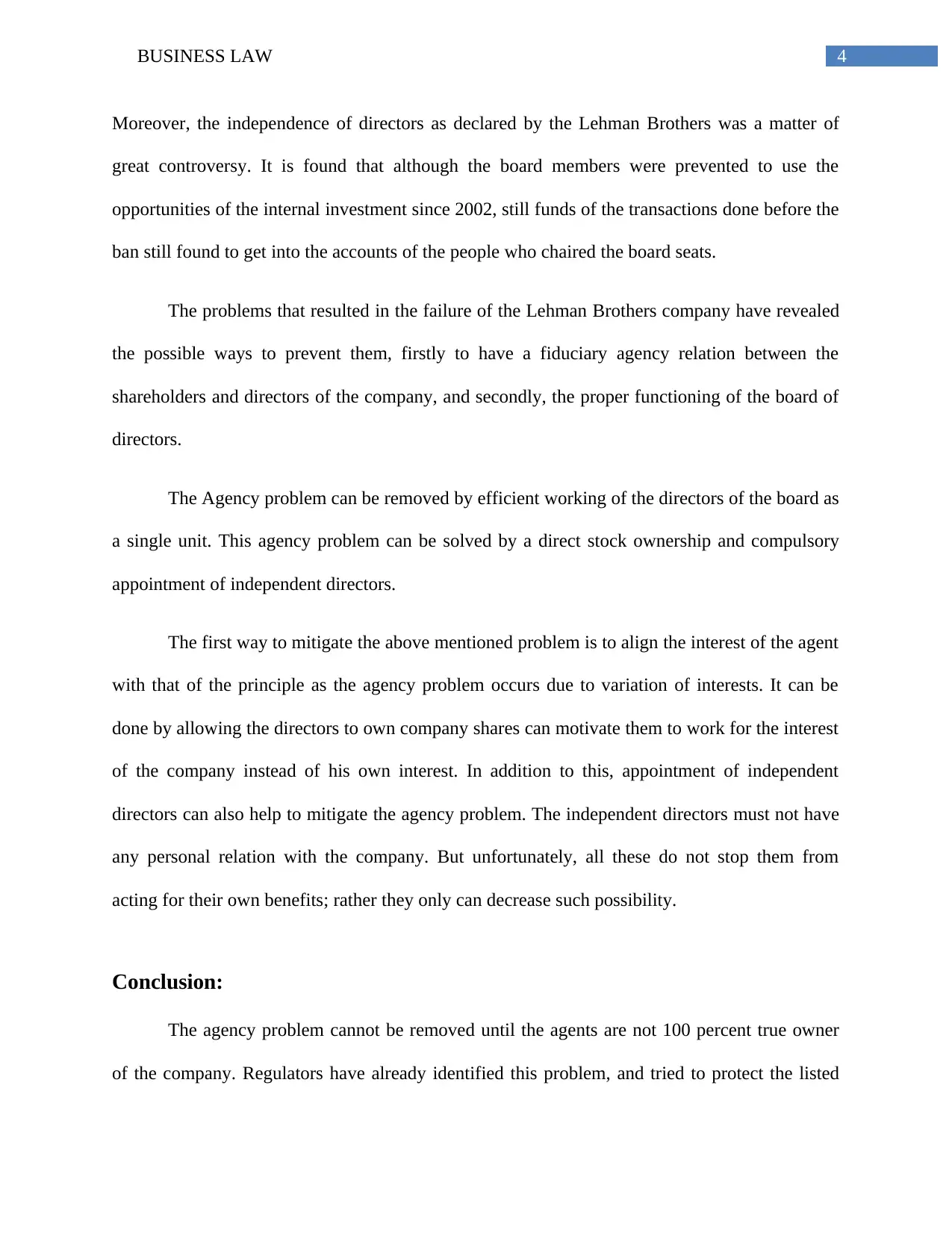
4BUSINESS LAW
Moreover, the independence of directors as declared by the Lehman Brothers was a matter of
great controversy. It is found that although the board members were prevented to use the
opportunities of the internal investment since 2002, still funds of the transactions done before the
ban still found to get into the accounts of the people who chaired the board seats.
The problems that resulted in the failure of the Lehman Brothers company have revealed
the possible ways to prevent them, firstly to have a fiduciary agency relation between the
shareholders and directors of the company, and secondly, the proper functioning of the board of
directors.
The Agency problem can be removed by efficient working of the directors of the board as
a single unit. This agency problem can be solved by a direct stock ownership and compulsory
appointment of independent directors.
The first way to mitigate the above mentioned problem is to align the interest of the agent
with that of the principle as the agency problem occurs due to variation of interests. It can be
done by allowing the directors to own company shares can motivate them to work for the interest
of the company instead of his own interest. In addition to this, appointment of independent
directors can also help to mitigate the agency problem. The independent directors must not have
any personal relation with the company. But unfortunately, all these do not stop them from
acting for their own benefits; rather they only can decrease such possibility.
Conclusion:
The agency problem cannot be removed until the agents are not 100 percent true owner
of the company. Regulators have already identified this problem, and tried to protect the listed
Moreover, the independence of directors as declared by the Lehman Brothers was a matter of
great controversy. It is found that although the board members were prevented to use the
opportunities of the internal investment since 2002, still funds of the transactions done before the
ban still found to get into the accounts of the people who chaired the board seats.
The problems that resulted in the failure of the Lehman Brothers company have revealed
the possible ways to prevent them, firstly to have a fiduciary agency relation between the
shareholders and directors of the company, and secondly, the proper functioning of the board of
directors.
The Agency problem can be removed by efficient working of the directors of the board as
a single unit. This agency problem can be solved by a direct stock ownership and compulsory
appointment of independent directors.
The first way to mitigate the above mentioned problem is to align the interest of the agent
with that of the principle as the agency problem occurs due to variation of interests. It can be
done by allowing the directors to own company shares can motivate them to work for the interest
of the company instead of his own interest. In addition to this, appointment of independent
directors can also help to mitigate the agency problem. The independent directors must not have
any personal relation with the company. But unfortunately, all these do not stop them from
acting for their own benefits; rather they only can decrease such possibility.
Conclusion:
The agency problem cannot be removed until the agents are not 100 percent true owner
of the company. Regulators have already identified this problem, and tried to protect the listed
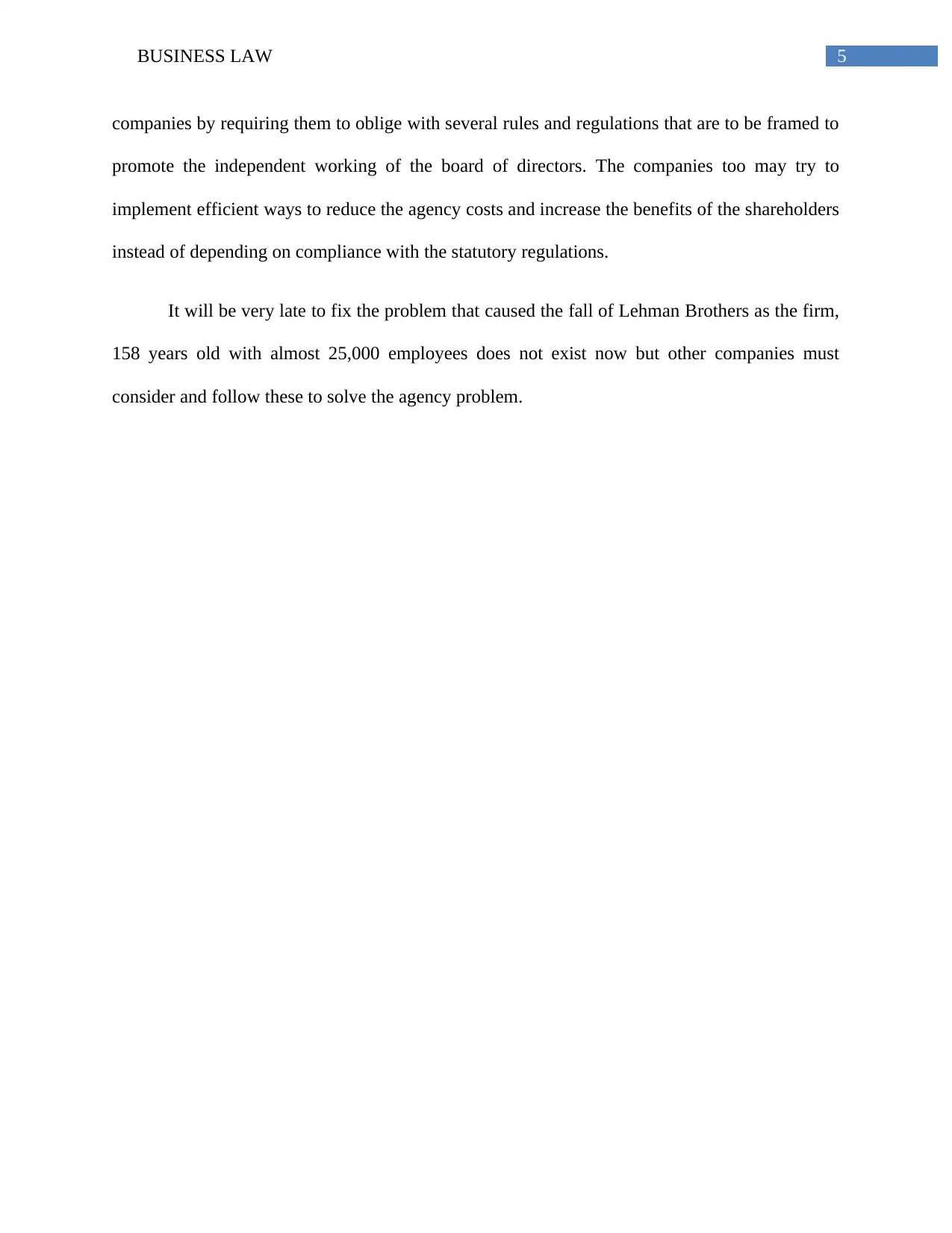
5BUSINESS LAW
companies by requiring them to oblige with several rules and regulations that are to be framed to
promote the independent working of the board of directors. The companies too may try to
implement efficient ways to reduce the agency costs and increase the benefits of the shareholders
instead of depending on compliance with the statutory regulations.
It will be very late to fix the problem that caused the fall of Lehman Brothers as the firm,
158 years old with almost 25,000 employees does not exist now but other companies must
consider and follow these to solve the agency problem.
companies by requiring them to oblige with several rules and regulations that are to be framed to
promote the independent working of the board of directors. The companies too may try to
implement efficient ways to reduce the agency costs and increase the benefits of the shareholders
instead of depending on compliance with the statutory regulations.
It will be very late to fix the problem that caused the fall of Lehman Brothers as the firm,
158 years old with almost 25,000 employees does not exist now but other companies must
consider and follow these to solve the agency problem.
⊘ This is a preview!⊘
Do you want full access?
Subscribe today to unlock all pages.

Trusted by 1+ million students worldwide
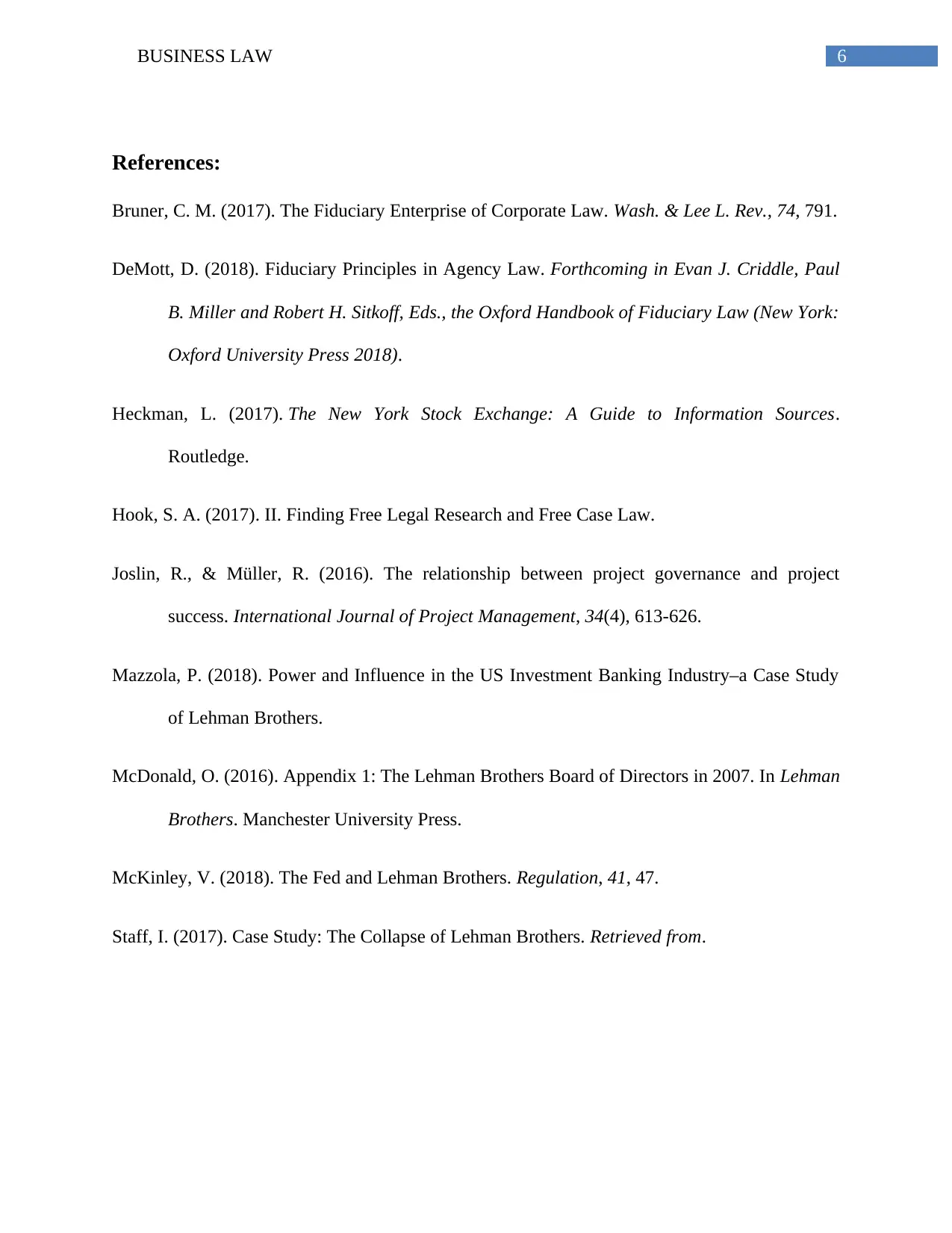
6BUSINESS LAW
References:
Bruner, C. M. (2017). The Fiduciary Enterprise of Corporate Law. Wash. & Lee L. Rev., 74, 791.
DeMott, D. (2018). Fiduciary Principles in Agency Law. Forthcoming in Evan J. Criddle, Paul
B. Miller and Robert H. Sitkoff, Eds., the Oxford Handbook of Fiduciary Law (New York:
Oxford University Press 2018).
Heckman, L. (2017). The New York Stock Exchange: A Guide to Information Sources.
Routledge.
Hook, S. A. (2017). II. Finding Free Legal Research and Free Case Law.
Joslin, R., & Müller, R. (2016). The relationship between project governance and project
success. International Journal of Project Management, 34(4), 613-626.
Mazzola, P. (2018). Power and Influence in the US Investment Banking Industry–a Case Study
of Lehman Brothers.
McDonald, O. (2016). Appendix 1: The Lehman Brothers Board of Directors in 2007. In Lehman
Brothers. Manchester University Press.
McKinley, V. (2018). The Fed and Lehman Brothers. Regulation, 41, 47.
Staff, I. (2017). Case Study: The Collapse of Lehman Brothers. Retrieved from.
References:
Bruner, C. M. (2017). The Fiduciary Enterprise of Corporate Law. Wash. & Lee L. Rev., 74, 791.
DeMott, D. (2018). Fiduciary Principles in Agency Law. Forthcoming in Evan J. Criddle, Paul
B. Miller and Robert H. Sitkoff, Eds., the Oxford Handbook of Fiduciary Law (New York:
Oxford University Press 2018).
Heckman, L. (2017). The New York Stock Exchange: A Guide to Information Sources.
Routledge.
Hook, S. A. (2017). II. Finding Free Legal Research and Free Case Law.
Joslin, R., & Müller, R. (2016). The relationship between project governance and project
success. International Journal of Project Management, 34(4), 613-626.
Mazzola, P. (2018). Power and Influence in the US Investment Banking Industry–a Case Study
of Lehman Brothers.
McDonald, O. (2016). Appendix 1: The Lehman Brothers Board of Directors in 2007. In Lehman
Brothers. Manchester University Press.
McKinley, V. (2018). The Fed and Lehman Brothers. Regulation, 41, 47.
Staff, I. (2017). Case Study: The Collapse of Lehman Brothers. Retrieved from.
1 out of 7
Related Documents
Your All-in-One AI-Powered Toolkit for Academic Success.
+13062052269
info@desklib.com
Available 24*7 on WhatsApp / Email
![[object Object]](/_next/static/media/star-bottom.7253800d.svg)
Unlock your academic potential
Copyright © 2020–2026 A2Z Services. All Rights Reserved. Developed and managed by ZUCOL.





